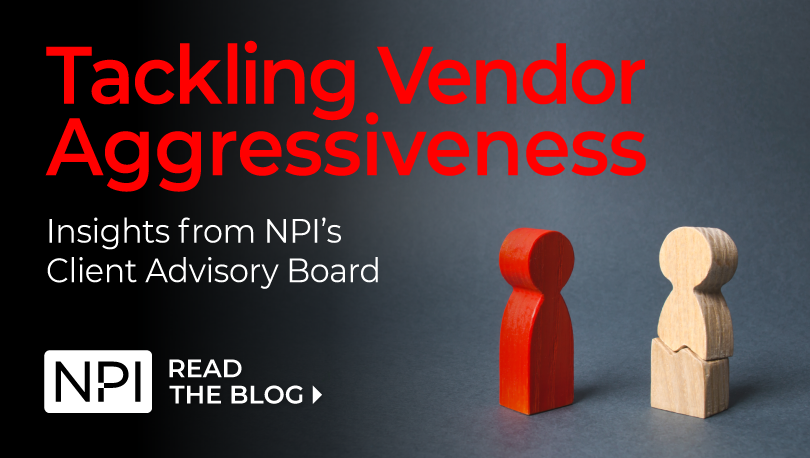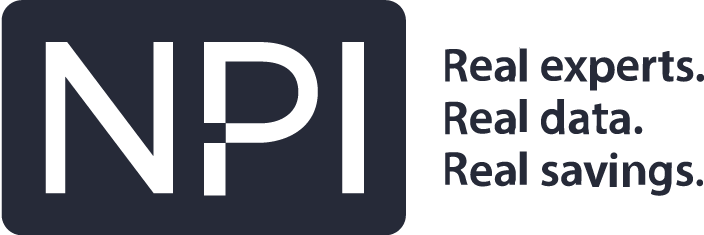BLOG
Tackling Vendor Aggressiveness: Insights from NPI’s Client Advisory Board
In today’s economic climate, technology vendors are more aggressive than ever, prioritizing margin expansion over customer collaboration. At NPI’s recent Client Advisory Board (CAB) meeting, industry leaders shared strategies for navigating tough vendor negotiations, managing audit risks, and optimizing application portfolios.
Our CAB comprises IT procurement executives from some of the most well-known brands in the world – they are on the leading edge of large enterprise IT procurement excellence. Here are the key takeaways from our discussion.
Vendors Are “Going to War” – Here’s How to Push Back
With mounting economic pressures, many technology vendors are adopting a “going to war” mindset – favoring aggressive sales tactics over customer partnership. Organizations must buy only what they need and fully utilize purchased licenses to counter vendor-driven price hikes.
Early planning is key. Our CAB members say they are starting negotiations much earlier, in part to send signals to the vendor that other solutions are under serious consideration (whether they are or not…). Companies that start renewal negotiations 12 to 18 months in advance can take control of the process instead of ceding the reins to the vendors (who will typically delay). Proactive engagement gives organizations leverage to secure better pricing and contract terms.
How to Handle Aggressive Vendors
When facing strong-arm tactics, organizations can use internal escalation and external visibility as leverage. For example, senior leadership involvement can shift the negotiation dynamic and force vendors to reconsider aggressive terms. Also, public relations risks (such as exposing unfavorable vendor practices) can be used strategically to push back.
However, smaller companies lack the bargaining power of industry giants, making early strategy development even more critical. Identifying revenue-driven pressure tactics early and rejecting them outright prevents unnecessary cost increases.
The Impact of Private Equity on Vendor Pricing
Private Equity (PE) ownership adds another layer of complexity. PE-backed vendors are notorious for aggressive price hikes and rigid contract terms, especially as they move through different investment stages. Customers working with these vendors should expect minimal pricing flexibility and take a long-term approach to mitigating cost increases.
Software Audits: A Growing Risk
Major vendors like Oracle, SAP, and even cloud providers are ramping up audits to extract additional revenue. Audit penalties are rarely avoidable, as vendors rely on complex use rights and customer confusion to uncover compliance gaps.
The best way to minimize risk? Proactive software asset management and routine license position assessment. Organizations should regularly review their entitlements, track actual usage, and maintain clear documentation to ensure compliance before an audit even begins.
Application Rationalization & Vendor Consolidation Strategies
Consolidating buying power by eliminating some overlapping technologies can be a powerful cost-saving tactic. And if you really pull the trigger, it has the added benefit of reducing the number of vendors to be managed. Note: reducing the number of vendors was a common objective across our CAB, largely driven by cost and risk management goals. Suggested tactics include:
- The threat of RFPs to push vendors into more competitive pricing.
- Early IT involvement (up to two years in advance) to drive negotiation leverage. Research your portfolio and identify overlaps – whether you implement the application rationalization or not, skillful use of this information will drive savings. Tell the vendor early-on that you are considering alternatives.
- Breaking down vendor offerings into individual components to introduce competitive pressure.
Some companies are taking bolder action, such as replacing Salesforce with Microsoft Dynamics, as a means to optimize costs and align with long-term IT strategies. Vendor evaluation tools that map products to alternative solutions have also proven valuable in streamlining rationalization efforts.
Stay Proactive, Not Reactive
The peer insights shared during our Client Advisory Board meeting reinforce a critical truth: IT vendor relationships must be managed strategically, not passively.
Companies that plan ahead, stay vigilant against aggressive pricing tactics, and explore vendor consolidation opportunities will be in the best position to control IT costs and secure better contract terms.
RELATED CONTENT
BULLETIN


